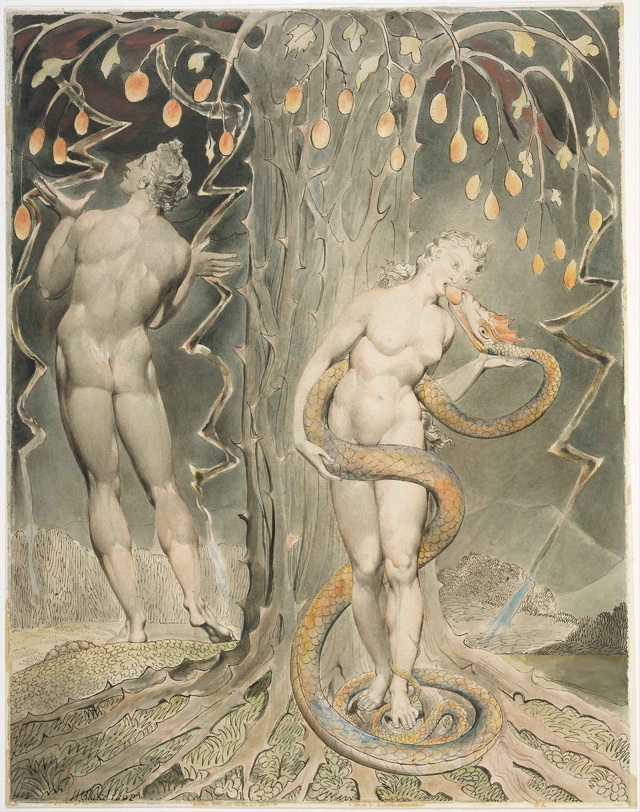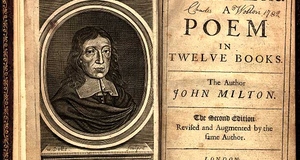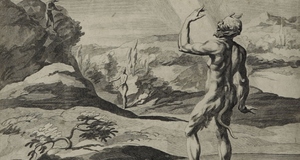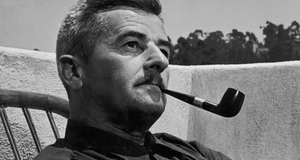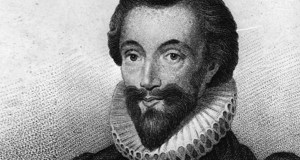Featured Article:Comparing Godly and Satanic Happiness in John Milton's Paradise Lost
By
2016, Vol. 8 No. 08 | pg. 1/2 | » AbstractTwo conflicting modes of living—happiness pursued obediently (Godly) versus happiness pursued disobediently (Satanic)—produce persistent problems with conceptions of free will in John Milton’s Paradise Lost. The Godly mode of happiness recognises that one is free to choose their path to human happiness, but only within God’s bounds; the Satanic mode of happiness recognises that one is entitled to human happiness, but not limited by God’s bounds. It is the relationship between these two modes of living that reveals a Miltonic paradox—free to choose human happiness but only within bounds—that remains unresolved by the poem’s end. This essay explores Milton’s paradox of free will through an investigation of the most pivotal figure of disobedience within Milton’s didactic project—Eve—through tracking her transgression of God’s bounds in the pursuit of her own human happiness. The result of this investigation reveals a catalogue of contradictions that undermine Milton’s claims to explain and justify the actions and commandments of a perfect but limiting God. For the modern reader, the essence of Satan’s argument, quoted above, strikes a familiar note because it sounds like a distillation of our own common motivations for good living. Satan’s argument is built on the seemingly modern notion that humans are entitled to happiness without bounds; an entitlement driven by an endless restlessness in need of a cure that can only be delivered with the chimerical perfection of humanity. John Milton’s argument, on the other hand, is built on the seemingly limiting notion that humans are entitled to happiness only within God’s bounds; an entitlement shaped by an authority that grants the cure to an essentially submissive humanity. It is the conflict created between these two opposing modes of happiness—happiness pursued obediently versus happiness pursued disobediently—that are scrutinised within this essay’s investigation of Paradise Lost (PL). Particular attention is directed toward the temptation and fall of Eve—arguably the most pivotal figure of disobedience within Milton’s didactic project—in order to narrow discussion down to the allegorical implications of human transgression committed in the pursuit of happiness. Such a focus exposes an ongoing problem with Miltonic conceptions of free will—free to choose but only within bounds—revealing itself as a paradox that remains unresolved by the poem’s end. This paradox of free will is by no means unique to Paradise Lost, but more an inherent feature of Milton’s theology that causes problems for the consistency of his message found throughout his poetry and polemical prose. For the purpose of this essay, such a paradox is interpreted as a result of the conflict created between obedient and disobedient modes of pursuing happiness in Paradise Lost. It has become commonplace in any assessment of Paradise Lostto flag the problem of distance between the era of Milton and that of the modern reader as a potential inhibitor to any thoroughgoing assessment of Milton’s work. In an attempt to avoid such a pitfall this essay will incorporate C. S. Lewis’s famous pragmatic suggestion that we should ‘plunge right into [Milton’s] world as if we believed it’, since ‘Milton’s thought when purged of its theology does not exist’.2 Literally, Lewis wants neophytes and novitiates to approach Paradise Lost with a sound grasp of Milton’s theology as it is set down in his polemical tracts and treatises; figuratively, this must entail a trying-on of Milton’s clothes to help us ‘judge the work in the same spirit that its author writ’.3 Inhabiting the body and consciousness of a seventeenth-century Protestant polemicist is Lewis’s suggested approach here, if only to gain access to contemporaneous insights that facilitate a better appreciation of Paradise Lost on its own terms. With Lewis’s prompting in mind, key points within this essay are buttressed with excerpts drawn from Milton’s Areopagitica, Of Education, and The Reason of Church Government, all of which exhibit clear indications of Milton’s theology and hold the key to enabling a fuller grasp of Paradise Lost’s polemical import.4 Milton’s expressed rationale for his poem is to ‘justify the ways of God to men’, but it should be acknowledged that Milton writes with an agenda that goes well beyond the aims set down in the opening lines of Paradise Lost. Audience edification is the subtextual aim for Milton, and the poetic form serves him well in this respect, not only as the most effective means of mass communication available to him under the Licensing Order of 1643, but also as one of the preferred literary forms for any Renaissance moralist wanting to direct his readers toward the highest end. For Milton, ‘doctrinal and exemplary’ is the quality of writing he wants to present, and ‘honour and instruction of [his] country’ is the effect he wants to achieve.5 Such aims for the long-term betterment of an audience have long been associated with poetry’s purported potential to instruct and delight its audience. It is a common enough principle passed down to us from Renaissance theorists who commonly regarded poetry as a form of expression well-established as a ‘pedagogue of ethics, politics, and theology’; a function promoted and practised in the works of classicists such as Horace, through to neo-classicists such as Edmund Spenser.6 We find one example of Milton’s support for poetry’s didactic potential in his conspicuous approval of that ‘sage and serious poet Spenser’, whom he views as a ‘better teacher than Scotus or Aquinas’.7 In Milton’s opinion, The Faerie Queene’s ‘survey of vice’ through the figure of Guyon is the best teacher of the virtue of ‘true temperance’.8 Milton here is specifically promoting Spenser’s use of allegorical example as ‘better’ than ‘reading all manner of tractates’, since an uncritical consumption of dogma from those tracts merely leaves a ‘cloistered’ virtue ‘unexercised’ by the faculty of reason.9 Such an attitude toward the instructive role of poetry, with its ability to refine faith through the sharpening of audience reason, goes some way to explain Milton’s titanic effort to deliver a poem that compels readers to revisit the work, again and again, in order to clarify their own interpretations of his allegory. It is through this ceaseless reassessment of the poem that Milton aims to purify his audience through the continual ‘trial’ and ‘scanning of error to the confirmation of truth’.10 The trial of Eve in Paradise Lostis a case in point and exemplary of the kind of teaching-by-example that Milton’s prose promotes. Satan’s success in diverting Eve from God’s way—by steering her through an episode of extended deliberation toward transgression and eventual expulsion from that seemingly happy Paradise—represents Milton’s overarching lesson in disobedience-by-example. His lesson hinges on Eve’s enjoyment and loss of an exalted form of happiness (prelapsarian beatitude); a quality of life originally bestowed through God's benevolence, and contingent upon obedience to his injunction not to eat fruit from a forbidden tree. Herein lies the problem for Eve, for as we discover, Eve’s dissatisfaction with beatific life allows Satan to direct her discontent toward the supposed empowering qualities of the prohibited fruit. It is Satan’s very reasoning with Eve that exposes a prolonged tension between modes of happiness pursued obediently and disobediently within Paradise Lost. This tension requires detailed analysis as a first step to better understanding the paradox of free will that results. We can situate Satan’s intriguing penetration of Eve’s dream as his first attempt to lead her toward any serious contemplation of transgression, and it is deserving of our attention due to the insight it gives into Satanic notions of happiness. During the dream, Satan accesses an unguarded, sleeping Eve, as he squats ‘like a toad close at [her] ear’, allowing him to present a number of arguments sotto voce that challenge Eve’s enjoyment of Paradisal beatitude (4.800). Satan’s grounds for transgression are assessed in sequential order as they appear in Eve’s dream. First, Satan tries to foster anthropocentricism in Eve with his appeal to her as the centre of all that is valuable in Paradise. He suggests that all of the beauty bestowed by God in the natural surroundings is valueless without the presence of Eve’s gaze. For Satan, nature exists ‘in vain if none regard’—thereby marking Satan’s first attempt to inflate Eve’s sense of self-worth to that of a human god (5.44). Second, Satan directs Eve’s attention to the apparent wisdom-giving qualities of the ‘Tree of Interdicted Knowledge’ (5.22). She is urged to ease the overabundance of knowledge that sits waiting to be plucked by ‘god [or] man’—thereby marking Satan’s democratic insistence that Eve is entitled to participate equally in wisdom with the gods (5.60). Third, Satan casts doubt on Eve’s current state of happiness in suggesting she will be happier once she attains god-like wisdom from the fruit. He proposes that Eve will be ‘happier’ when she can metaphorically live ‘among the gods… not to earth confined’, if only she had the chance to enjoy the knowledge she rightly deserves—thereby marking Satan’s interrogation of Eve’s Paradisal happiness in the service of kindling her curiosity to know more like a god (5.75-8). To sum-up Satan’s case, we can see that a high level of self-worth, leading to an inflated sense of entitlement, teamed with limitless curiosity, are the key attitudes that he tries to induce in Eve to fuel her disobedient pursuit of an imaginary form of happiness. All of these motivations are familiar in that they resemble the key drivers of humanity’s universal restlessness that have come to surface in every age. As Darrin M. McMahon reminds us, we only have to look to our own modern creed that cries out ‘we can be happy, we will be happy, we should be happy’.11 So it follows that pride, and entitlement, both of which kindle the curiosity to push forward in our never ending projects of self-improvement, appear as the three most familiar traits of modernity’s pursuit of happiness, and we have seen that all three traits are captured so succinctly within Satan’s arguments presented in Eve’s dream. Yet all three traits are treated as undesirable within Paradise Lost, and ought to be curbed by the presence of Milton’s God—whose presence is in all things—or glutted in his precepts. If we turn momentarily to the closing books of Paradise Lost, we quickly learn that Milton’s chief lesson for his audience is that ‘God whom to behold’ represents the ‘heighth of happiness’ (10.724-25). This lesson in repression culminates in the denouement when Adam finally learns that he should ‘hope no higher’ than God’s limits because it is the height of ‘folly to aspire’ outside those limits (12.576, 12.560). We can see then, that Milton’s God and his offerings, whether in the natural world or in his commandments, are presented as the sweeping cure for humanity’s restless pursuit of happiness. Clearly, in light of these doctrines set out so explicitly in the final books of Paradise Lost, Eve’s dream is just one chapter contributing to Milton’s overarching lesson against humanity’s aspiration for a form of happiness that escapes the authority of God. Looking at the narrative structure of Paradise Lost, we can see the dream episode performs a number of functions within the plot. First, it provides in microcosm a rehearsal of Satan’s arguments that he will further expand on later in the narrative during his successful temptation of Eve when she is awake and fully conscious. Second, it allows Milton to show his audience that Satan cannot influence Eve toward transgression without the consent of her will that is left sitting out-of-action while she sleeps. The work of Diana Trevino Benet is helpful here for assessing the status of Eve’s will during the dream. She notes that any ‘notion that Satan could infect the unconscious [Eve] with sin runs counter to the linchpin of Milton’s moral philosophy’; a philosophy that places so much value on free will to accept or reject sin [emphasis added].12 We can locate a correlative comment on this very principle within Milton’s prose that supports Benet’s conclusion about Eve’s innocence. Milton says ‘to the pure... the knowledge cannot defile... if the will and conscience be not defiled’.13 If we interpret Eve’s dream in line with Milton’s thought, we can conclude that Satan’s attempt to instill disobedience in Eve fails because her will does not have the chance to assess his arguments for transgression. One indication that Satan fails to sway Eve is that she feels ‘glad’ to have ‘waked to find [Satan’s reasoning] but a dream’—not a lived reality with real consequences (5.92). It necessarily follows that Eve does not approve of Satan’s sinful suggestions. Such a conclusion finds additional support in Eve’s memory of the dream as possible ‘trouble’ when she wakes, which gives a strong indication that she is still ‘innocent’ after the dream, and can still enjoy her ‘happy state’ with Adam whom she still recognises as her ‘glory’ and ‘perfection’—a sentiment marking obedience that befits her station in God’s order (5.96, 5.209, 5.234, 5.29). According to Peter A. Fiore, Eve’s dream dramatises the operation of an Augustinian principle that identifies ‘deliberation of the will’ as a necessary and constituting part of ‘the very essence of sin’.14 As we have just seen, Eve’s dream with its sinful associations does not involve the operation of her will, leading us to conclude at this point in the narrative that she has not yet sinned. Deliberation of the will plays an essential role in maintaining Eve’s Augustinian integrity. Her integrity is represented by Milton as a preternatural gift bestowed on Eve that grants her freedom from concupiscence (sin); a freedom that can only be maintained ‘with the dictates of [her] reason’.15 Fiore reminds us that Eve’s potential to sin through concupiscence encompasses not only the pressure of ‘fleshly desire’, but also ‘any and every motion or impulse of the lower faculties or appetites’ not governed by reason [emphasis added].16 If we turn our attention now to Milton’s various depictions of humanity’s appetitive pursuit of happiness, we see he uses a selection of metaphors similar to those used by Augustine in The Happy Life to describe humanity’s appetitive drive for happiness.17 For Milton, the bodily effects of thirst and hunger are repeatedly used to convey the drive for happiness; for Augustine, the essential drives of thirst and hunger are similarly shown as embodiments of an elemental yearning for happiness. Augustine describes the unhappy as ‘hungry and famished’ in their pursuit of ‘nutrition’.18 They are driven by an appetite that can only be satisfied through the attainment of ‘understanding and knowledge’.19 We quickly detect these Augustinian metaphors when we shift our focus back to Eve’s dream and notice that Satan presents the forbidden fruit as a sure avenue to happiness, with its own overpowering appeal emitted via a ‘savory smell’ that ‘quicken[s]’ Eve’s ‘appetite’ almost tipping her toward tasting the fruit (5.84, 5.85). In the hands of Satan, this lure of god-like knowledge is presented as tapping into an essential human drive, like hunger, for a higher form of happiness. Extending this metaphor to its extreme, Eve later yields to her pressing hunger when ‘greedily she engorge[s]’ the fruit ‘without restraint’ while ‘nor was godhead from her thought’ (9.791, 9.790). These descriptions show that Satan’s eventual corruption of Eve weakens her will to such an extent that she can no longer govern her appetite. Consequently, she falls into the sin of concupiscence led by an unbridled will to know more like a god in her disobedient pursuit of an illusory path to a happier life. The chief lesson for Milton’s audience is found in Eve’s punishment by expulsion from Paradise; a punishment for deliberately choosing a path that breached God’s bounds. Looking more broadly now at how Eve’s disobedience is figured throughout Paradise Lost, John. K Hale is helpful in turning our attention to Milton’s use of voice—whether it be Satan’s, Adam’s, or God’s—for directing Eve during key episodes of her development.20 Hale identifies the word voice as one of the ‘major words’ that ‘lead us to the centre’ of the poem’s highly unified narrative.21 He does this through highlighting Leo Spitzer’s discussion of the ‘philological circle’ in order to trace how the word voice steers the reader in a cyclical movement through the poem.22 Put briefly: at every instance of encountering the word voice, we are forced to oscillate our attention between episodic detail and the poem as a whole, all with the aim of building a more comprehensive interpretation of the word as our reading progresses.23 This observation rings true in our reading of Paradise Lost when we recollect the various influences of voice on Eve’s treacherous trajectory: first, Eve’s dangerous fixation on her reflected image in the lake is broken by God’s warning ‘voice’ just hours after she is first created (4.463); second, Eve is then ‘guided’ by God’s ‘voice’ alone toward Adam to whom she should direct her gaze (8.484); third, Satan’s ‘gentle voice’ calls Eve to join him on a tempting nocturnal excursion foreshadowing serious consequences for Eve later in the narrative (5.37); fourth, Satan’s sophistic ‘voice’ makes its way ‘into the heart of Eve’ ultimately causing her fall (9.550); fifth, ‘the voice of God’ brings Eve’s ‘ears’ to attention in anticipation of God’s judgement (10.97, 10.99). At each instance Eve has to decide whether to heed what the voice is telling her, and at each instance the voice represents a test of her obedience to God. To gain a richer, trans-historical interpretation of the word voice as it is used in these key episodes, Hale shows us that it is helpful to look at the etymology of the related verb to hear, which is found to be derived from Latin oboedire (to obey).24 Hale does not go so far as to suggest Milton is intentionally restoring this Latin meaning for his audience, but Hale does use the etymology to remind us of the relevant Biblical commandment set down in Exodus that instructs believers to ‘diligently hearken to the voice of the Lord thy God [emphasis added]’.25 This added etymological information helps us interpret Milton’s various uses of voice as contributing to one grand lesson for his audience—who would be familiar with the Biblical quotation—that they should always ‘give’ their ‘ear to [God’s] commandments’ (Exodus 15:26). This precept is effectively conveyed through Eve’s conduct in her successes and failures to listen correctly to the voices she encounters. Through viewing Eve as Milton’s chief figure of disobedience in his didactic project, we can track her eventual fall as a clear demonstration of how an incorrect hearing of Satan’s convoluted arguments beguiles her into thinking a breach of God’s bounds will bring her happiness. It is instructive to look at how other creation myths explain humanity’s elemental yearning for happiness, if only to prosecute a better critique of the restlessness that lies at the heart of Eve’s disobedience. David Malouf is helpful in this respect for turning our attention to the role of Epimetheus and Prometheus in the creation myth recounted in Plato’s Protagoras. In this genesis story, Epimetheus is given the task of assigning various ‘powers’—including ‘strength’, ‘speed’, ‘flight’, ‘size’, and ‘protection’—to all ‘non-rational creatures’, only to find that once he has finished the task there are no other powers left to assign ‘human kind’.26 Man is left ‘naked and unshod without any covering for his head or any fangs or claws’, leaving him weaker than the animals.27 To make up for the deficiency in man, Prometheus gives man the ‘skill’ to ‘use fire’ as a means of self-preservation, thereby aligning man with the gods in his enjoyment and exploitation of such a ‘divine gift’.28 This new skill gives man the ‘practical art’ to cultivate food, and produce clothing and housing for the benefit of his protection and survival.29 The advantage man gains over animals is through his ability to create solutions—through curiosity, ingenuity, productivity—that help overcome his inherent weaknesses. Malouf rightly observes that in this narrative the restlessness that drives human innovation can be interpreted as a strength in man, since it allows him to become the ‘shaper of his world, of his environment and conditions’.30 Man can be the figurative author of himself when granted such agency. When we compare this story to the myth of creation recounted by Raphael in PL, we are left with a markedly more passive picture of man. Raphael recounts that ‘on the sixth day’ man was created as the ‘master work’ and ‘endued with reason’ in the image of God (7.504-510).Continued on Next Page » Suggested Reading from Inquiries Journal
Inquiries Journal provides undergraduate and graduate students around the world a platform for the wide dissemination of academic work over a range of core disciplines. Representing the work of students from hundreds of institutions around the globe, Inquiries Journal's large database of academic articles is completely free. Learn more | Blog | Submit Latest in Literature |

